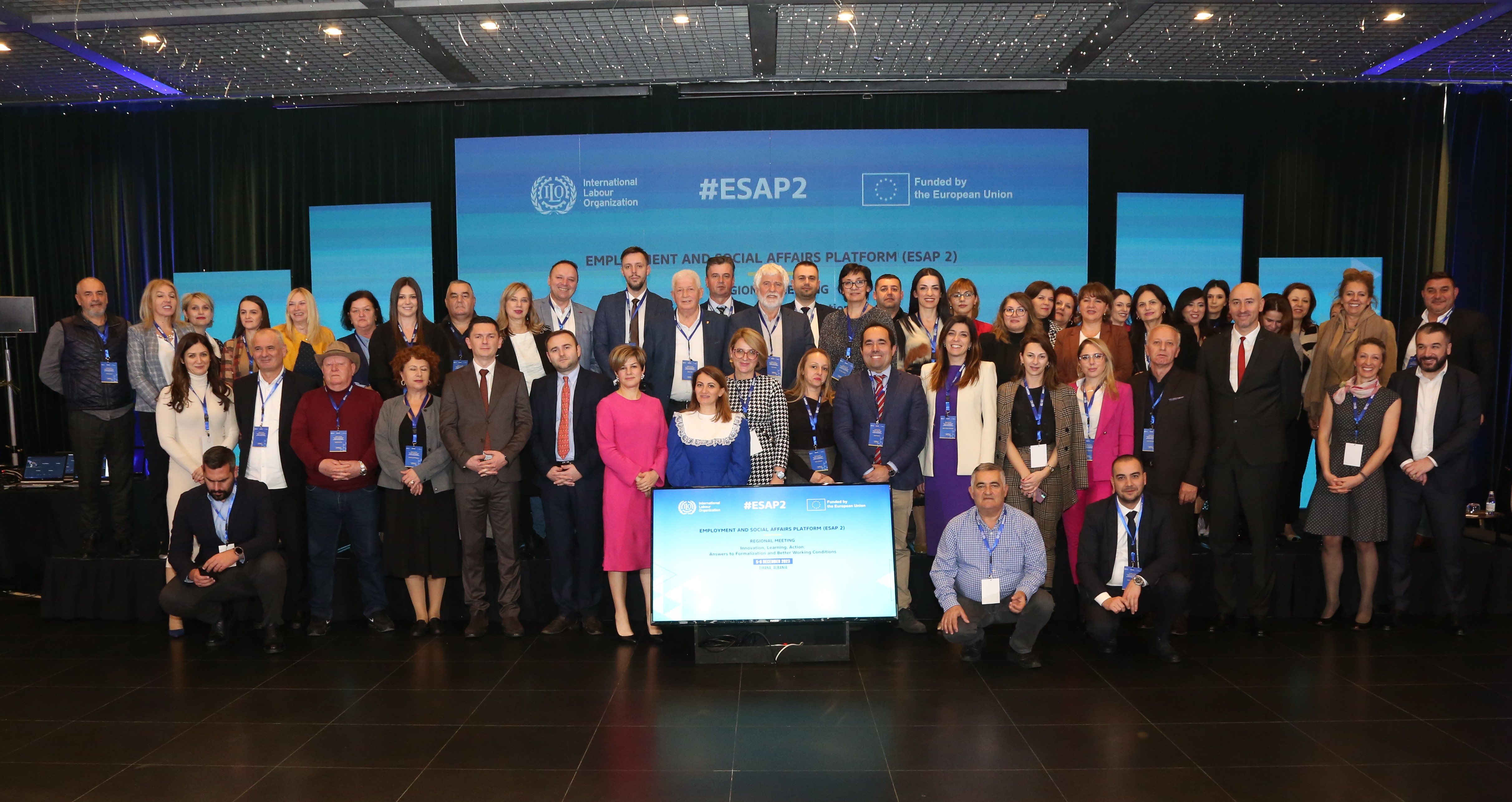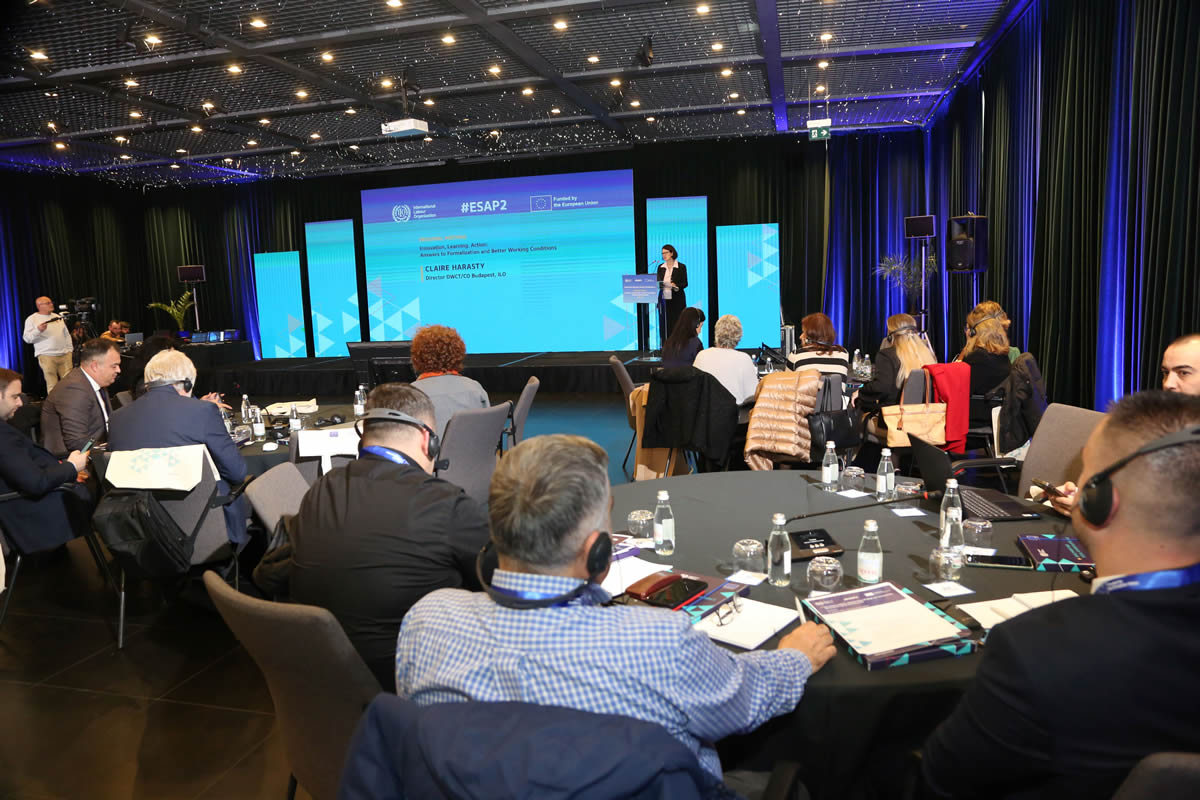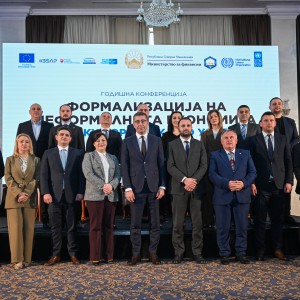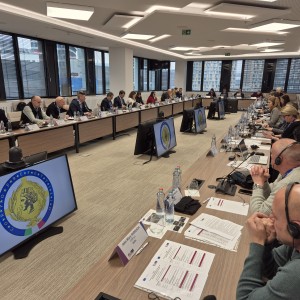News
12 December 2023 |News
ILO ESAP 2: Innovations and paving path to better working conditions

ILO ESAP 2: Innovations and paving path to better working conditions
More than 60 participants from the Western Balkans gathered this week in Tirana, Albania, for Employment and Social Affairs Platform (ESAP) 2 regional meeting to discuss project’s accomplishments, explore innovations and pave path towards better working conditions.
This meeting also marked an end to ESAP 2, a three-year project funded by the European Union and implemented by the International Labour Organization (ILO).
Short video of the event can be found here.
During the first day of the event, participants were welcomed with opening remarks by Ada Huibregtse, ILO’s Chief Technical Advisor. Huibregtse stressed that “this was a project focused on learning. But we did not learn from our offices. We got out in the field, sat down with our partners and planned actions together. They implemented them and we supported or implemented together with them. We did, then we learned, and then we did some more. Analysis and reflection were a constant element of this project.”
Claire Harasty, director of ILO’s Decent Work Country Programmes in Budapest also greeted the guests and emphasized the role of innovations in the ILO’s work “I am proud to see project’s accomplishments and ILO’s role in harnessing new technologies to achieve better working conditions. Leveraging transformative technologies and supporting innovation for decent work and just transition is a core priority for the ILO. The ILO has the capability to do it and we will continue to support our constituents to catch up and keep up with time.” Furthermore, Ms. Harasty emphasized that active involvement of tripartite constituents in policy making, and implementation is a fundamental driver of creating better working conditions for all. Therefore, the ILO will continue to strengthen social dialogue in the Western Balkans with focus on collective bargaining and strengthening of social partners.
Albin Gega from the Albanian Ministry of Finance and Economy emphasized that ESAP 2 project has been crucial for continued reforming of the Albanian State Inspectorate of Labour and Social Services (ASILSS), support for the development of the national Occupational Safety and Health Strategy and necessary changes in the regulatory framework allowing for an effective system of amicable settlement of labour disputes. Furthermore, he expressed the commitment of the Albanian government to progress on Chapter 19 commitments.
The first day continued with the panel Innovation for Effectiveness: The Role of Digitalization and Artificial Intelligence in the Work of Labour Inspectorate in Albania with speakers Eljo Mucaj, Chief Labour Inspector, Albania; Irida Qosja, Deputy Chief Labour Inspector, Albania; Eleni Alogogianni, Head of the Electronic Governance Directorate, the Hellenic Labour Inspectorate, Greece; and Ada Huibregtse, Chief Technical Advisor at the ILO.
This panel focused on ILO’s work with the ASILSS in developing a risk assessment tool based on data mining and machine learning and creating adequate informational technology environment and human capacities to take advantages of artificial intelligence. Ms. Huibregtse noted that based on work with ASILSS, “we have hard evidence that artificial intelligence (AI) can augment people’s and institution’s capacity to be more effective in their work; to reduce costs per unit, thus be more efficient. She noted that “new technologies including digitalization of processes are a must, but without a clear vision, they become a financial burden with little to add to productivity and progress.”
In his presentation Eljo Mucaj gave overview of challenges labour inspections face, including the limited number of labour inspectors covering the country. He then presented the digital innovations that were created to cope with these challenges culminating with the Matrix of Penalties 2.0 to Risk Assessment System in developed and completed with the ESAP 2 project support in 2023.
Irida Qosja spoke about matrix of penalties, a digital tool that helps the inspectors in the decision-making process by calculating the administrative measures. The Matrix improved the quality of inspection process, equality of treatment of similar infringements, monitoring system of inspectors’ performances, and the accuracy of data collection, analysis and reporting. Transition from Matrix to Matrix 2.0 was successfully conducted as a result of experience with digital tools and a carefully implemented capacity building of the entire work force of the ASILSS.
Eleni Alogogianni argued that use of machine learning in Labour Inspectorates’ risk assessment tools ensure advanced analysis of large and complex databases of employment and inspections; building of predictive modeling for data-driven inspection planning & policymaking; bias mitigation in business targeting; knowledge extraction for capacity building & strategic planning; and better allocation of human & financial resources to increase overall effectiveness.
The panel ended with two main points. One was about the need for transparency of decision-making. This requires that black-box predictive models are avoided, while those such as the ones adopted by the ASILISS are clear and transparent. The second noted the importance of not outsourcing decision-making entirely to the systems using artificial intelligence. Humans must continue to have the driving seat in policy decision-making and implementation while taking advantage of AI’s analytical power.
The following panel Tax and Minimum Wage Reform in Montenegro: Effects on Labour Market and Informality introduced the audience with findings of the impact assessment of the 2022 minimum wage and tax reform “Europe Now” in Montenegro. Christian Traxler, Hertie School Berlin, Germany and Peter Haan, Freie Universität Berlin and Deutsches Institut für Wirtschaftsforschung, Germany emphasized that the 2022 reform caused a sizable increase in average wages mainly driven by a strong increase in earnings at the lower end of the income distribution. Nearly 35 per cent of all jobs were lifted to the level of the new minimum wage, while positive spillovers on jobs with earnings between €550 and €1,250 took place after the reform. This reform, unlike counterparts in other countries, did not cause any quantitatively meaningful loss in employment. A summary of this assessment was disseminated to participants and can be downloaded here.
The Panel Undeclared Work in Occasional and Seasonal Work in North Macedonia: A Scope for Non-Standard Forms of Employment? kicked off with an outline of the pilot intervention implemented by the ILO within the ESAP 2 project in Ohrid and Struga, North Macedonia. It was difficult to identify a policy or measure to address undeclared work that did not require substantive changes in the labour law, said Huibregtse. There was interest, however, among employers’ organization and trade unions and local Economic and Social Councils to learn whether occasional and seasonal workers would formalize as a result of subsidized tax wedge for workers and reduced administrative burden for employers. This pilot contributed to supporting 136 women and men declare or fully declare their work. The assessment of motivations for formalization resulting from the pilot were presented by Blagica Petrevska, Chief Economist, Finance Think, North Macedonia. This measure did not motivate occasional workers to declare their work, but it proved successful for seasonal workers. Young people, especially students, prefer seasonal contracts because they offer flexibility which allows them to balance work with studies and to gain some financial independence. However, the regulatory framework while in compliance with the ILO Convention 138 and other international labour standards, it creates hurdles for those employers and workers to engage in occasional work or seasonal work.
Maja Papatolevska, the Head of the Labour Department at the Ministry of Labour and Social Policy spoke about initiatives that the government of North Macedonia has taken to create an enabling environment for occasional and seasonal work. She stated that “the development of society should aim to ensure workers' rights, regardless of whether they are in a regular employment relationship or in some non-standard form of work. Thus, the right to limited daily and weekly working hours, the right to daily and weekly rest, fair salary, and safe and healthy work conditions must be part of every contract, either verbal or in written form.”
Martine Humblet, Senior Specialist of Working Conditions, ILO, presented selected findings of the ILO diagnostic report about non-standard forms of employment in North Macedonia. This report delved into types of contracts, key elements of national legislation, and types of work.
The day wrapped up with panel ESAP 2 a Catalyst for Regional Cooperation: Added Value of the Network of Agencies for Amicable Settlement of Labour Disputes in the Western Balkans.
Ivica Lazović, Director of the Agency for Amicable Settlement of Labour Disputes, Serbia, mentioned the value of ESAP 2 project. “As two key values of ESAP 2 project, I would mention education and exchange of experiences among various institutions that deal with the amicable settlement of labour disputes in the region. Development of cooperation between these agencies in the region is also important” said Lazović.
Speaking about the successes of his agency, Lazović presented following “Just last year, 36 of collective labour disputes referred to 160 thousand employees. This corresponds to 7% of the total workforce in Serbia for whom the decisions made by our arbitrators were deemed valid”.
Enesa Rastoder, Director of the Agency for Amicable Settlement of Labour Disputes, Montenegro, was also participant at the panel.
“We closed 1,000 agreements last year. But we need to work with employers on prevention of violation of workers’ rights. We want to have less and less disputes and satisfied employees who can live decently from their work” said Rastoder.
ILO National Coordinator for Serbia, Jovan Protić emphasized the ESAP 2’s importance for Western Balkans. “ESAP 2 has been the backbone of regional cooperation in amicable settlement of labour disputes and achieved important synergies with other ILO projects in the strengthening of ASLD institutions in the region” said Protić.
All panels were followed up with discussions.
The second day opened with the presentation Western Balkans Growth and Reform Agendas by Bernd Wild from the European Commission’s Directorate-General for Employment. He presented Western Balkans growth plan, reform agendas with indicative priorities for all countries that include governance, public administration reform, public financial management, private sector development and business environment, energy and green transition, digitalization, human capital and rule of law. He also presented indicative areas of reform for Western Balkans countries, per country.
The regional meeting concluded with discussions about importance of occupational safety and health (OSH) and social dialogue in the Western Balkans. The participants put forth numerous ideas and proposals on how to promote OSH and social dialogue in the region.









